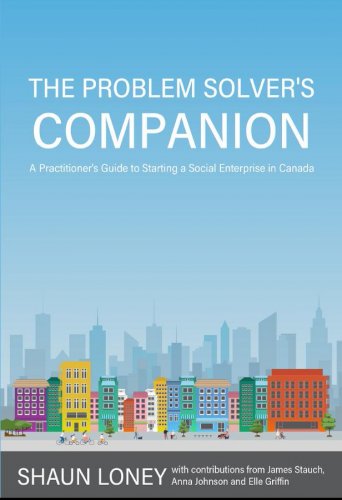This guide is mainly about the first of these terms. We’ll talk about the others, but the focus of this guide is on the enterprise. Social enterprise is a noun. It’s simply any business — including and especially a non-profit — that is primarily focused on a social purpose. By the way, when we say “social purpose,” or “social” anything in this guide, it’s meant to include health, environmental, cultural or other common-good purposes. The social enterprise may take many different legal or governance forms. It can be for-profit, though it’s usually non-profit. It can also be cooperatively owned. We’ll get into more of this later. The 2010 Canadian Task Force on Social Finance defines social enterprise as “…any organization or business that uses market oriented production and sale of goods and/or services to pursue a public benefit mission.” Bottom line, it’s community+enterprising+public outcomes.
Social enterprise should flourish when there is social innovation — there should be more of them, they should start, retool and scale more quickly, and they should have lots of support and guidance. Universities, non-profits, accelerators and incubators, and now governments and the corporate sector, are all talking about social entrepreneurship and social innovation. There is a tidal wave of conversation — floating atop of which is a froth of action.
But make no mistake: The implications — and benefits — for government are big: Social innovation can also mean turning government from a funder (colonial) into a customer (decolonial). Business as usual just isn’t cutting it. Social problems are insatiable, stubborn and expensive. Well thought-out solutions are cheaper. Every. Single. Time.
The implications for non-profits are just as big: It’s about stepping up from the kids table, where we are stuck with grants-based funding and donations as our main revenue options while the private sector gets to use outcomes oriented tools. Non-profits need to stop giving away our lucrative outcomes by valuing them and selling them. Ain’t nobody gonna buy something from us if we aren’t selling it. And you may be thinking of selling goods and services. Yes! Please do. But social enterprises can sell social outcomes as well…
Download The Problem Solver’s Companion
Table of Contents
Step 1 Don’t Follow This!
Step 2 Understand the Problem
Step 3 Explore Many Possible Solutions
Step 4 Cost the Problem & Create Markets for Solutions
Step 5 Generate Ideas
Step 6 Find Your “We”
Step 7 Start Lean
Step 8 Choose a Form
Step 9 Tell Your Story
Step 10 Change Policy
Step 11 Start Again
More Help from a Few of our Favourites…
Endnotes





